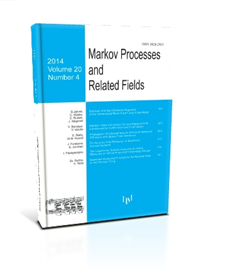Moderate Deviations for a Class of Mean-Field Models
P. Eichelsbacher, M. Lowe
2004, v.10, Issue 2, 345-366
ABSTRACT
We derive moderate deviation principles for partial sums $S_n$ for triangular arrays of dependent random variables, known as Curie - Weiss models. Outside the critical inverse temperature $\beta_c=1$ we obtain a quadratic rate function, at the critical temperature the rate function is non-Gaussian: under appropriate assumptions on the underlying measure there exists a positive real number $\lambda$, and a positive integer $k$ such that $S_n/n^{\alpha}$ satisfies a moderate deviations principle with speed $n^{1-2k+2 \alpha k}$ and rate function $- \lambda x^{2k}/(2k!)$ for every $ 1- 1/(2k) < \alpha <1$. Moreover, we analyze the moderate deviations behaviour as the temperature $1/\beta_n$ converges to one and obtain a threshold for the speed of this convergence to one: if $\beta_n$ converges to $\beta_c$ fast enough, faster than ${\mathcal O}(n^{2 \alpha (k-1)+ 2 -2k})$, then the non-Gaussian rate function persists, whereas for $\beta_n$ converging to one slowly, slower than ${\mathcal O}(n^{2 \alpha (k-1)+ 2 -2k})$, the moderate deviations principle is given by the Gaussian rate. At the borderline the moderate deviation rate function is the one at criticality plus an additional term.
Keywords: moderate deviations,mean-field,Curie - Weiss model,critical temperature,large deviations
COMMENTS
Please log in or register to leave a comment

